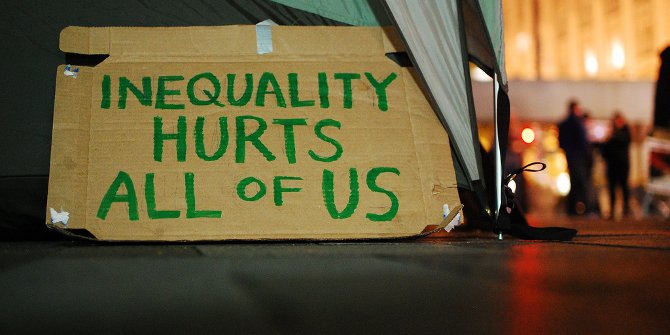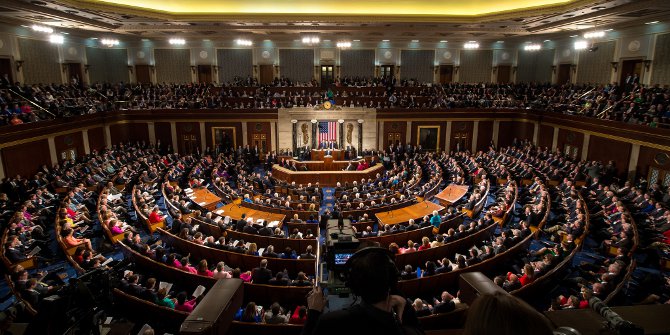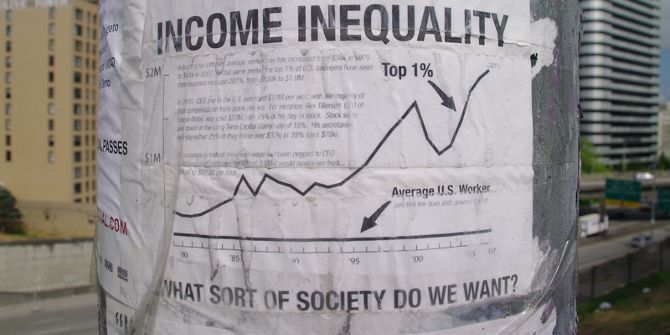 Last week the Obama Administration issued an executive order on guidelines for overtime pay, a measure which will help 12.5 million Americans. Thomas Hayes writes that this move is President Obama’s latest effort to address inequality in America, an effort which has met with some success, despite opposition from a polarized Congress. Looking ahead to the general election, he comments that while Hillary Clinton and Bernie Sanders would be very likely to continue Obama’s legacy with similar policy proposals geared towards tackling inequality, most of Donald Trump’s policies would make inequality worse.
Last week the Obama Administration issued an executive order on guidelines for overtime pay, a measure which will help 12.5 million Americans. Thomas Hayes writes that this move is President Obama’s latest effort to address inequality in America, an effort which has met with some success, despite opposition from a polarized Congress. Looking ahead to the general election, he comments that while Hillary Clinton and Bernie Sanders would be very likely to continue Obama’s legacy with similar policy proposals geared towards tackling inequality, most of Donald Trump’s policies would make inequality worse.
As the United States heads into the 2016 general election, the economy and the issue of economic inequality is at the center of many heated political debates between voters, candidates, and the media. Economic inequality is a topic often addressed by President Obama, and as he winds down his final year in office, the president is both eyeing his economic legacy and continuing to focus on economic inequality through policy action and rhetoric.
Recently, the administration issued an executive order that outlined new guidelines for overtime pay, which the Economic Policy Institute estimates will help 12.5 million working people. Most of the 12.5 million will be newly eligible for overtime pay while others will see their rights strengthened. Following this move, some are pushing the administration to use executive authority to circumvent Congress on taxes as well, arguing that the President could instruct the Treasury Department to end the carried interest tax loophole, which allows for a lower tax rate on income for the super wealthy (managers at private equity and hedge funds). Ending this loophole could generate an estimated $180 billion in revenue over 10 years. This money could, theoretically, be redistributed to low and middle income Americans.
Would such action be unprecedented? Not in the contemporary era of the ‘New Imperial Presidency’ or one that has seen Congress be historically unproductive. Polarization and congressional inaction have helped spur unilateral executive action by Republican and Democratic administrations alike. While the Obama administration has used executive orders less frequently than recent presidents, this administration has not shied away from unilateral action (it’s worth noting that few candidates in this election cycle have called for limits on presidential power as well). In fact, the administration has used unilateral executive action to combat growing economic inequality; recently, the administration instructed the Treasury Department and IRS to change the rules on corporate inversions, a process in which companies move their corporate headquarters to a new country with the goal of paying fewer taxes.
Such actions, while important for addressing growing inequality, remain limited in the face of a polarized Congress, where GOP leadership does not share the president’s priorities for (or methods of) combating inequality. Economic inequality has been rising since the late 1970s and has continued to increase during President Obama’s tenure. This is not to say that the administration’s policies have had zero impact on inequality. Among the many actions taken since 2008, the administration expanded health care to many who did not previously have access, increased taxes on upper-incomes, expanded tax credits to low-income families, and moved to close the gender pay gap. In the long run, these will likely reduce inequality, and there is some evidence that, at least compared to the previous presidential administration, such policies have reduced inequality more than if Bush policies remained intact.

Credit: Dean Chahim (Flickr, CC-BY-NC-SA-2.0)
Future inequality is of course also dependent upon decisions by the next presidential administration. Research demonstrates clear differences in both income growth and levels of inequality for Democratic versus Republican presidential administrations. While the presumptive Democratic nominee Hillary Clinton has vowed to largely protect Obama’s legacy and continue similar policy proposals, she has offered additional programs and goals that could reduce inequality. Among these policies proposals are paid family leave, an increase to the federal minimum wage, debt free college, and changes to the tax code (Clinton has also called for an end to the carried interest loophole). While Bernie Sanders’ proposed policies would likely go much further in addressing structural inequality, he is unlikely to gain the party’s nomination given his current deficit in delegates. Sanders has helped bring the issue directly to voters and also forced the country to consider large-scale proposals aimed at redistribution.
It’s not entirely clear what kind of economic policies a Donald Trump administration would put forth, partly because the candidate and his campaign have often shifted positions, and sometimes devoted more time to discussing his hand size than to specific policy proposals. Setting aside the reality TV antics and twitter posts that have received considerable free media attention, Trump’s appeal is, in part, due to his ability to speak to economic malaise. The fact remains that most Americans’ wages and incomes have remained stagnant over the period of growing inequality (even after the economic recovery that followed the Great Recession). Often using this as a backdrop to his economic rhetoric, Trump has argued that the US should use its bargaining power to drive down prescription drug prices, drawn attention to the amount of money in politics, and highlighted how American workers lose out from existing trade agreements. He has sometimes strayed from traditional Republican orthodoxy on taxes and entitlement programs. At times, Trump has also called for higher taxes on the wealthy, though this policy too has seen many reversals over the course of the campaign. Trump as well has focused on the carried interest loophole as a prime example of problems in the American tax code. Yet the billionaire reality TV star will make an unlikely champion for those in poverty as most policy proposals his campaign have put forth would likely exacerbate inequality. Trump has called to repeal the Affordable Care Act (though he has favored a universal health care system in the past). He has also called for ending the Dodd-Frank financial reform as well as other regulations. And recently, Trump reversed course and called for substantially cutting taxes for the wealthy. Such proposals would likely intensify income differences between the ultra-wealthy and everyone else.
Whichever party wins the presidency next year will be facing large structural inequality that would take significant policy action to reverse. A piecemeal approach is unlikely to make a large dent in the trend of increasing inequality, which has reached levels not seen since the Gilded Age. Because of this, the issue of economic inequality is likely to be an issue that will persist well into future presidential elections.
Please read our comments policy before commenting.
Note: This article gives the views of the author, and not the position of USAPP– American Politics and Policy, nor of the London School of Economics.
Shortened URL for this post: http://bit.ly/1sq12rH
_________________________________
 Thomas J. Hayes – University of Connecticut
Thomas J. Hayes – University of Connecticut
Thomas J. Hayes is an Assistant Professor at the Department of Political Science at the University of Connecticut. He specializes in the fields of American politics and political behavior, with an emphasis on economic inequality. His current research projects examine the degree to which institutional decisions influence attitudes toward disadvantaged groups, the electoral components that lead to unequal representation, and the ways in which unified party control can affect the income distribution.






